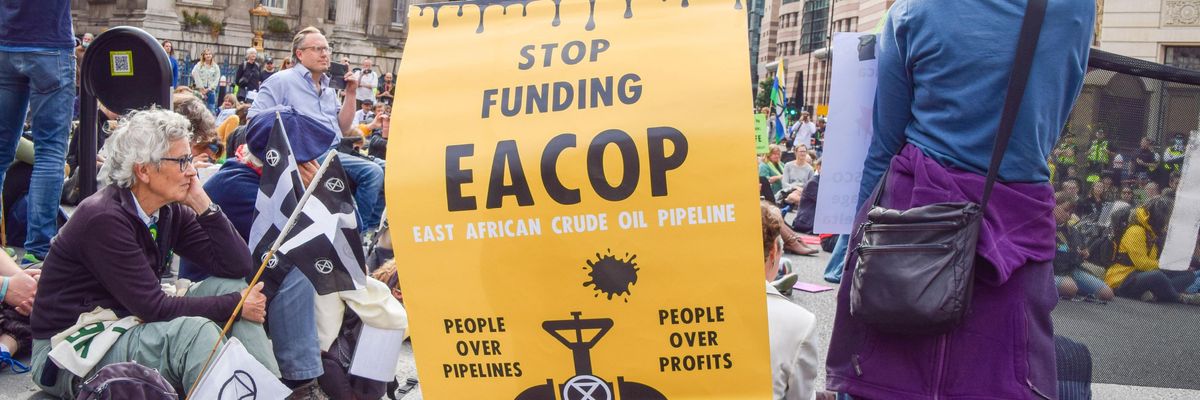In the heart of East Africa, a battle is raging. Hundreds of thousands of climate activists, environmentalists, and local communities have consistently united in resistance against the East African Crude Oil Pipeline, or EACOP, project, an endeavor that threatens to undermine both the region's fragile ecosystems and global climate goals. Their call for divestment from this fossil fuel project is not just a local outcry; it's a rallying cry for global solidarity in the fight against climate change and human rights injustices.
The EACOP project is a proposed 1,443-kilometer pipeline that aims to transport crude oil from landlocked Uganda to the Tanzanian coast for export. The proponents of the project are TotalEnergies, which owns a 62% stake; China National Offshore Oil Corporation (CNOOC), with an 8% stake; and the governments of Uganda and Tanzania, each with a 15% stake. EACOP will facilitate crude oil transportation from associated projects: Tilenga, where drilling is led by TotalEnergies, and Kingfisher, where CNOOC leads drilling.
While project proponents argue that it promises economic development and increased energy access for the region, the stark reality is that it poses severe environmental and social risks. The pipeline would traverse sensitive ecosystems, including wildlife reserves and wetlands, and has already displaced local communities, leaving them vulnerable to harm and with little to no compensation. In July this year, New York-based human rights organization Human Rights Watch called for a halt to the project following research and a report released by the organization, outlining the negative socioeconomic impacts of the proposed pipeline on local communities as well as its projected role in exacerbating the climate crisis.
Africa risks being locked into a fossil fuel-dependent trajectory, perpetuating environmental degradation and exacerbating global warming, without adequate support.
TotalEnergies started oil drilling activities in Uganda's cherished Murchison Falls National Park (MFNP) in July this year, posing a severe threat to the park's biodiversity, its status as a beloved tourist destination, and the foundation of Uganda's economy. The park has been a significant contributor to Uganda's economy, accounting for a staggering 59% of the country's exports and generating $1.047 billion in revenue in 2022 alone. By venturing into oil drilling, MFNP's essential contributions to Uganda's socioeconomic fabric now hang in the balance.
Earlier in January 2023, Ugandan President Yoweri Museveni launched drilling at the Kingfisher oil field, switching on the rig that will drill the field's 31 oil wells. The Kingfisher oil field extends from the shores of Lake Albert three kilometers into the lake, and activists fear oil could be spilled into the lake or nearby villages and question how waste from the project will be managed.
Beyond environmental destruction and community displacement, a report by the Climate Accountability Institute indicated that EACOP would emit 379 million tonnes of CO2 equivalent during the proposed 25-year project lifetime. This comes at a time when the need to urgently meet lofty climate ambitions and meet the basic energy needs of the people in a clean, affordable, and accessible manner has been a paradox for many nations both in the Global North and the Global South.
What's even worse is that some financial institutions are considering funding this project even as affordable and viable clean energy alternatives such as solar and wind are abundant, particularly in Africa. Between 2016 and 2020, Goldman Sachs provided $1.69 billion in finance for Total and $348 million for CNOOC. Furthermore, Bank of America provided $1.96 billion in finance for Total between 2016 and 2020. Leading insurers such as AIG, Liberty Group, Chubb, and reinsurance group Marsh are projected to insure the EACOP project.
There's no doubt that the causes of global warming can be traced back to human economic activities, predominantly driven by the affluent nations of the Global North. As a historically industrialized country, the U.S. bears its fair share of responsibility for the current climate crisis. compared to developing nations in the Global South, which have contributed far less to global warming. Financing fossil fuel projects in the Global South further exacerbates the existing climate inequalities. It is an act of disregarding historical responsibilities while enriching the fossil fuel sector, at the expense of long-term global well-being. The delay in providing climate finance since the Paris Agreement in 2015 has left these nations defenseless in the face of increasing extreme weather events, rising sea levels, and food insecurity. This perpetuates a cycle of poverty and undermines poverty reduction efforts, potentially pushing millions more into destitution.
At the risk of sounding redundant, Africa risks being locked into a fossil fuel-dependent trajectory, perpetuating environmental degradation and exacerbating global warming, without adequate support. This poses a moral quandary as Africa seeks to balance its responsibility towards the planet and the urgent need to uplift its people from poverty. The international community must recognize this dilemma and demonstrate a genuine commitment to achieving the global commitment of $100 billion a year to support developing countries' fight against climate change.
As the resistance against the East African Crude Oil Pipeline continues to grow, the global community must stand in solidarity with those on the frontlines of this battle. Our planet's future depends on it. The fight against climate change is not a regional issue; it's a global imperative. It's time for financial institutions to recognize this and divest from projects that threaten our collective future, demonstrating that global solidarity can and must extend to Africa and beyond.




